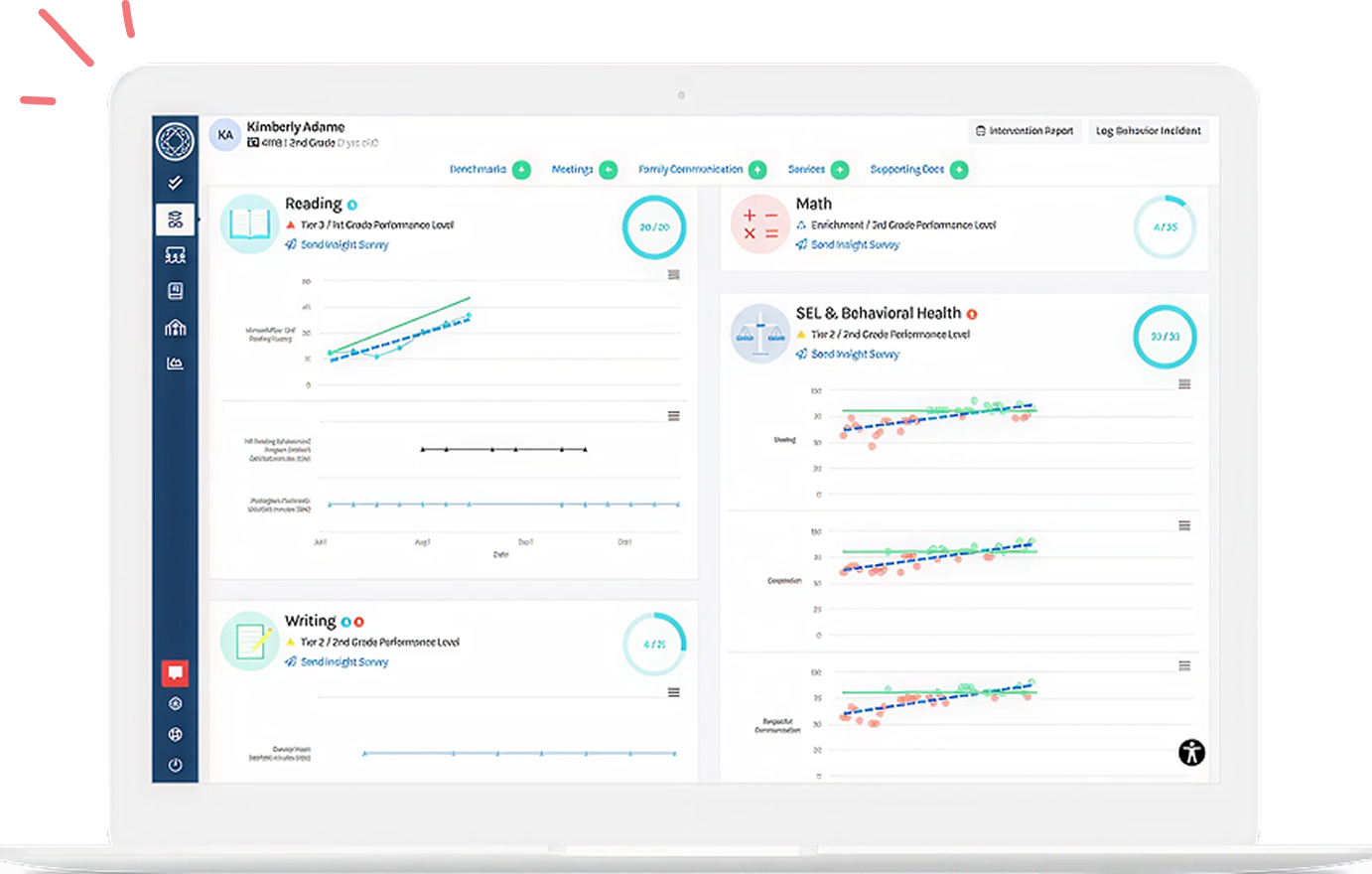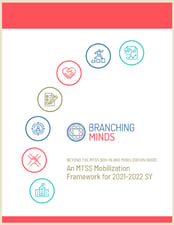Long before the pandemic shuttered our nation’s schools in mid-March 2020, many districts across the country had been working to transition to MTSS (Multi-Tiered Student Support System). Schools started to let go of traditional models to evaluate students for special education and instead began moving towards a Whole Child approach to consider the needs of all students. Many chose to transition to MTSS because it uses a multi-tiered support foundation that wraps around a school’s entire student body and uses data-driven problem-solving to address academic and non-academic (attendance, social-emotional, etc.) needs. Schools and districts making this shift found that they improved education for all students, gained efficiencies, and prevented students from “slipping through the cracks.”
➡️ Read more: MTSS as Organizing Principle for Moving Beyond the 2020-2021 School Year
Today, September is in full swing, and it’s the time of year that we start heading back into the classroom (or zoom!)—most of you have already begun to, and some of you are still counting down your last days of summer vacation. It’s also time to roll up our sleeves to help students “catch up” from last year’s instructional and schooling loss.
And as you all know, getting ready for a new school year is crucial, but it can also be a complex undertaking, especially at the tail of a pandemic! So we decided to round up some MTSS resources to help you start the school year fully geared up. There’s something here for everyone: whether you’re a classroom teacher, a school admin, a district leader, or an MTSS coordinator; if you’re exploring what MTSS is; if you’re working on developing an MTSS team, selecting an MTSS tool, aligning your MTSS implementation with the rest of the initiatives at your district, or simply strengthening communication and collaboration.
1. The Ultimate Guide to MTSS
This guide explores definitions and essential elements of MTSS and provides best practice recommendations and requirements for implementing an effective MTSS framework. The guide also outlines instructions for gathering accurate and reliable data, using data to make meaningful instructional changes for students, and establishing effective MTSS teams and system-level practices.
2. MTSS Buy-in and Mobilization Guide
Although we understand the word “transition” can be scary at times, transitioning your campus to MTSS does not have to be overwhelming or daunting. This MTSS Buy-in and Mobilization Guide provides the essentials to prepare for the transition to MTSS to make the change easier for schools.
3. MTSS Mobilization Framework
Rolling out MTSS can be daunting. We build step by step, year by year, to develop a clear vision, shared language, and aligned initiatives. We work with our teams to build capacity to understand better and accomplish the work. Let's be honest; the work doesn't always feel feasible. That's why we created this MTSS Mobilization Framework. It provides resources and actions for each key component at all of the 3 "phases"—foundational, developmental, and fully operational—of the implementation journey
4. Communication Planning for MTSS
As districts and schools look to strengthen their MTSS, how school leaders communicate the goals and the evolution of work becomes a forerunner of its acceptance, adoption, and eventual success. This blog provides some steps for a seamless MTSS transition.
5. Infrastructural Alignment for MTSS
By nature of its design, MTSS can serve as the ultimate problem-solving and communication path for a campus when the time and energy is spent first to align the MTSS principles with existing school programs and initiatives. Although this may feel overwhelming, using MTSS as a catalyst and a guide for alignment can be a positive, and ultimately incredibly valuable process. This blog provides some tried and tested steps to launch the alignment of MTSS at the school and district levels.
6. Turnkey Deck to Introduce MTSS to Your Team
Although we understand any change can feel scary at times, transitioning your campus to MTSS does not have to be overwhelming or daunting. These downloadable slides provide the essentials to prepare for the transition to MTSS and make the change easier for all.
7. Transitioning From a Discrepancy Model to MTSS
Traditionally, when used in education, the term “discrepancy model” refers to the process of evaluating if there is a mismatch between a child's intellectual ability and his academic achievement, which was then used to determine if a student qualified for special education services. This blog discusses ways to transition from a discrepancy model to MTSS.
8. MTSS Meeting Guide
This guide provides a breakdown of the three types of MTSS meetings. These three meetings are a school level meeting for school leadership to look at core curriculum health, benchmark growth, tier movement, distribution of resources, and evolution of structures; the grade team or content team community meeting, to create group plans for students who need tier 2 level support, and to check in on progress for all kids who need support; and an individual student support meeting to create individuated plans for students who need tier 3 level support.
9. How to use progress monitoring data to guide decision making in an MTSS practice
Effective progress monitoring is critical for a successful MTSS/RTI practice. This blog addresses how to set the right progress monitoring goals and how to interpret progress monitoring data.
10. 5 Considerations When Selecting an RTI/MTSS Intervention Management Software
Now that software solutions can play a real and meaningful role in supporting educators, districts must wisely choose their MTSS/RTI intervention management software. This blog provides five considerations for district and school leaders to consider as they search for a solution that will save their educators time and effort while driving stronger MTSS/RTI adoptions across their schools.
11. Developing a Successful MTSS/RTI Team
The MTSS/RTI team is a school-based problem-solving team; it is the engine that drives the MTSS/RTI practice. This blog addresses five questions to consider when developing an MTSS/RTI team.
12. Intervention Planning in MTSS: How to Balance Best Practices and Feasibility
Funding, staffing, schedules, and remote learning are all factors that can affect a district and school’s ability to implement supports and interventions in line with what we know from research and best practices for MTSS. This blog addresses five ways to balance best practices in MTSS with common barriers in education, such as lack of time and resources.
13. Benefits of and Strategies for Teacher Collaboration In & Outside of MTSS
Teacher collaboration is an essential element for school improvement across the nation. It is even more important when implementing a Multi-Tiered System of Support (MTSS) approach and certainly worth taking a deeper dive. This blog discusses the benefits and strategies for teacher collaboration inside and outside of MTSS.
More Resources
Leadership Support
- Developing an MTSS support team
- Establishing a common language
- Setting the stage for change
- Demystifying MTSS
- Collaborative school culture
- Actively leading and consistently communicating with participants
MTSS Team
- Distinct school teams
- A School MTSS Leadership team
- Professional Development Training
- Implementation goals are reviewed and revised annually
- Methods to analyze system health
Robust Core with Differentiated Instruction
- Core curriculum allows 80% of students to meet or exceed grade-level expectations
- Classroom behavior expectations
- Evaluate the health of the core curriculum
- Universal Screener Assessments
Consistent Universal Screening
High Quality, Well Documented Support Plans
Student Progress is Frequently Monitored
Let us help you build the right team!Branching Minds offers a variety of professional learning opportunities for states, districts, and schools to ensure instructional leaders, specialists, coaches, and teachers are able to implement RTI/MTSS as well as the BRM platform with fidelity and maximizes educators’ efforts to accelerate learning for all students. |
About the author
Branching Minds
Branching Minds is a highly respected K-12 services and technology company that leverages the learning sciences and technology to help districts effectively personalize learning through enhancements to their MTSS/RTI practice. Having worked with hundreds of districts across the country, we bring deep expertise in learning sciences, data management and analysis, software design, coaching, and collaboration. Combined with our extensive toolkit of resources, PD, and technology, we provide a system-level solution. We are more than a service or a software provider, we are partners who will deliver sustainable results for educators, and a path to success for every learner.

Your MTSS Transformation Starts Here
Enhance your MTSS process. Book a Branching Minds demo today.




















.png?width=716&height=522&name=5%20Tips%20for%20De-Escalation%20and%20Building%20Strong%20Relationships%20with%20Students(preview).png)
